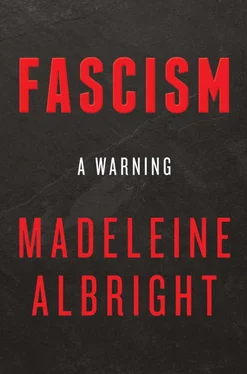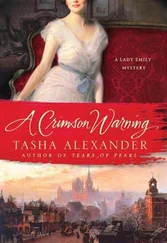Amid the unhappiness, several Fascist organizations arose, most prominently the Arrow Cross, a group that preached what it called “Hungarism.” This was an eclectic doctrine promising jobs, revenge, freedom from foreigners, eternal salvation, and the restoration of the stolen territory. Evidently, the menu was appealing because, by 1939, the Arrow Cross was the largest right-wing party. Its members, however, were so vituperative—and other Hungarian officials so cooperative—that when World War II broke out, Hitler had no need to work with the Fascists.
The Hungarian government joined the Axis in the hope of sharing in a rapid triumph, but when the prospects for success dimmed, that same government sought out the Western allies to negotiate a separate peace. Rather than tolerate such a betrayal, the Nazis gave full authority to the Arrow Cross, whose leaders promptly sent gangs of armed teenagers into the streets to terrorize the population. In the war’s final months, a wretched and wrenching drama played out in which tens of thousands of Hungarian Jews were worked to death at home or deported by train or on foot to concentration camps from which few ever returned. Arrow Cross members did not hesitate to murder Jews in the Budapest ghetto, including those with paperwork that showed them to be under international protection.
The 1920s, ’30s, and early ’40s were a time of rising nationalism coupled with technology-driven angst and revulsion at governments that appeared to be both corrupt and relics of an earlier age. The widespread questioning and tottering of faith caused prospective Fascist leaders to test their training wheels and spurred movements and fads of every description, from mysticism and belief in fairies to flagpole-sitting and a flirtation across the political spectrum with eugenics and its accompanying racial theories.
Mussolini’s early success energized those whose primary fear was Bolshevism or what they imagined to be Bolshevism: loud demands for higher wages, for example, or campaigns for land reform. In virtually every country, there were veterans who—regardless of which side they had fought on during the war—were contemptuous of civilian politicians. Anti-Semitism, whether casual or visceral, flourished in politics, the professions, academia, and the arts. The bewildering rush of globalization prompted many to find solace in the familiar rhythms of nation, culture, and faith; and people everywhere seemed to be on the lookout for leaders who claimed to have simple and satisfying answers to modernity’s tangled questions. Oswald Spengler, a German schoolteacher turned philosopher, argued that history moved in cycles. In 1918, he wrote:
The last century was the winter of the West, the victory of materialism and skepticism, of socialism, parliamentarianism and money. But in this century, blood and instinct will regain their rights…. The era of individualism, liberalism and democracy, of humanitarianism and freedom, is nearing its end. The masses will accept with resignation the victory of the Caesars, the strong men, and will obey them.
One man who saw himself in such a leading role was Sir Oswald Mosley, an adventurous Brit with a toothbrush mustache to match Hitler’s, a libido to equal Il Duce’s, and what was described by an acquaintance as “an overwhelming arrogance and an unshakable conviction that he was born to rule.” Well-bred and a consummate fencer (despite a clubfoot), Mosley spent World War I in recovery from a pair of broken ankles, the first incurred in a drunken brawl, the second when he crashed his airplane after flying in loops to impress his mother. Starting in 1918, he served in Parliament as a conservative, then as an independent, and next under the banner of the Labour Party, from which he resigned when its leaders rejected his plea for an enormous infrastructure program. Undaunted, Mosley founded the New Party, which ran candidates for Parliament in the 1931 election, with zero success. A still-game Mosley traveled to Italy for a close look at Mussolini’s effort to create a new Rome. To a frustrated politician harboring big dreams, the Italian model—with its freshly constructed though not yet fully paid-for bridges, aqueducts, grand halls, and broad avenues—seemed just the ticket.
Returning to London, Mosley founded the British Union of Fascists (BUF) on a platform featuring his signature public works program, anti-Communism, protectionism, and the liberation of Britain from foreigners, “be they Hebrew or any other form of alien.” In the tradition of Il Duce, he recruited a tough-looking security force, tutored his minions in the Roman salute, and distributed black shirts based on the design of his fencing jackets. By 1934, Mosley’s rallies were drawing large crowds of workers, shopkeepers, businessmen, elements of the nobility, disgruntled Tory politicians, and a smattering of reporters, soldiers, and off-duty bobbies. Party membership reached forty thousand. Eager to branch out, the BUF organized drinking clubs and football squads, but its effort to conduct a beauty pageant failed because of a shortage of interested applicants. At this juncture, Mosley’s personal evolution from British patriot to German lackey was complete: in 1920, George V had attended his first wedding; in 1936, Joseph Goebbels hosted his second, with Adolf Hitler among the half dozen guests.
British Fascism did not die quickly, but it did fade away. This was due in part to the government’s official policy of appeasement, which provided a more socially respectable home for Nazi empathizers. But what really dampened enthusiasm for Mosley’s Blackshirts was the spectacle of Hitler’s Brownshirts marching into the Rhineland, Austria, the Sudetenland, Prague, and—the move that finally triggered war—Poland. Suddenly the stakes were much higher, and being a Fascist was not so acceptable. William Joyce, BUF’s propaganda chief, fled to Berlin, where he began a second career as the infamous Lord Haw-Haw, a traitorous radio broadcaster. Mosley was arrested in the first year of fighting, but, this being England, Churchill allowed the highborn prisoner and his wife the courtesy of a small house with a vegetable garden and the right to hire fellow inmates as servants.
NONE OF THE EUROPEANS WHO, LIKE MOSLEY, SOUGHT TO FOLLOW in the footsteps of Mussolini and Hitler reached the top of their country’s power pyramid. In Spain, Franco invited the Fascist Falange party into his coalition, then swallowed it up. Portugal’s dictator, Antonio de Oliveira Salazar, embraced the authoritarian attributes of Fascism but rejected any rebellion against the Church or its doctrines. In France, the blue-shirted Solidarité Française was one of several right-wing groups that served as sparring partners for the left; the movement was openly pro-Nazi, campaigned on the slogan “France for the French,” and was banned by the Socialist government in 1936. Members of Iceland’s Nationalist Party wore gray shirts and red swastika armbands, swore to protect Icelanders’ ethnic identity, believed in Aryan supremacy, and never received more than one percent of the vote. In Romania, the army alternately suppressed and collaborated with the Legion of the Archangel Michael, a charismatic group with an impoverished rural following drawn to its mix of revivalist religion, revolutionary politics, and violence against Jews.
In these and other cases, Fascism was less defeated than diluted. Zealous foot soldiers helped drive nationalist passions in many countries, but the insurrectionary elements of the movements were contained before they could threaten the powerful. In Italy and Germany, former corporals called the shots; everywhere else, generals and their upper-crust civilian counterparts retained their grip on power.
Czechoslovakia, poised tensely in the Third Reich’s shadow, was a special case. There, Konrad Henlein, a shrewd, paunchy, nearsighted former gymnastics instructor, attached himself to the Nazi locomotive and let it pull him along. At Hitler’s instructions and with Berlin’s money, Henlein became the principal mouthpiece for Fascist elements within Czechoslovakia’s politically diverse German community. To foreign officials and the press, he spun tale after tale of his people’s mistreatment at the hands of brutal Prague. His fabrications, rebroadcast by the Nazis, had their effect. Many Europeans came to sympathize with Hitler’s declarations of outrage and found reasonable his desire to intervene on behalf of his country’s ethnic brethren.
Читать дальше
Конец ознакомительного отрывка
Купить книгу












